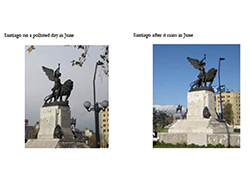Pollution Exposure and Human Capital Formation
Researchers: Prashant Bharadwaj (UC San Diego), Joshua Graff Zivin (UC San Diego), Matthew Gibson, and Christopher Neilson
Locations: United States and Chile
 A growing number of studies in public health and economics highlight the important role played by prenatal and early childhood health in the process of human capital formation. Since pollution adversely affects childhood health, the impacts of early-life pollution exposure on long-term human capital outcomes is of particular interest since pollution could have a sizable cost to society.
A growing number of studies in public health and economics highlight the important role played by prenatal and early childhood health in the process of human capital formation. Since pollution adversely affects childhood health, the impacts of early-life pollution exposure on long-term human capital outcomes is of particular interest since pollution could have a sizable cost to society.
This study merged data from the Chilean ministries of health and education with pollution and meteorological data to assess the impact of fetal exposure to carbon monoxide air pollution on human capital outcomes later in life, as measured by fourth-grade test scores in Santiago, Chile.
Results
Results show a strong negative effect from fetal exposure to carbon monoxide on math and language skills measured in fourth grade. These effects are economically significant and back-of-the-envelope calculations suggest the 50 percent reduction in CO in Santiago between 1990 and 2005—a period when sustained economic growth and new environmental policy allowed Santiago to transition from high levels of pollution to more modest ones—increased lifetime earnings by approximately 100 million USD per birth cohort.
The evidence from this study is of direct policy relevance. To the extent academic achievement in school can be linked to labor productivity, this study develops a quantitative estimate of the social costs of pollution through its effects on human capital production and highlights the sizable benefits incurred from pollution abatement policies implemented during the last two decades. Carbon monoxide is regularly emitted as a byproduct of fossil fuel combustion and subject to regulation across the world. The human capital impacts from pollution along with any attending avoidance behaviors constitute additional costs that should be weighed against the relevant benefits from the generation of air pollution.
Related Publications
Bharadwaj, Prashant, Matthew Gibson, Joshua Graff Zivin, and Christopher Neilson. 2016. "Gray Matters: Fetal Pollution Exposure and Human Capital Formation." Journal of the Association of Environmental and Resource Economists 4 (2): 505–42. https://doi.org/10.1086/691591.

